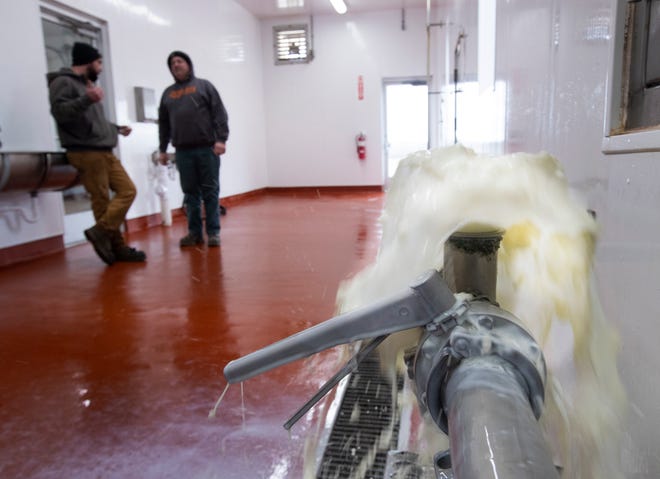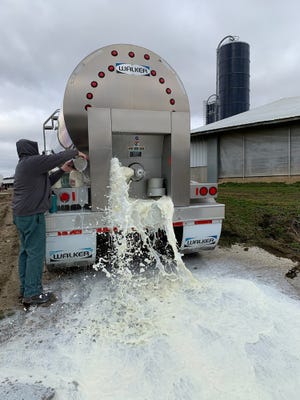Boson Dairy Farmers Forced To Dump Milk - Food Shortages Somehow Lead To Smaller Market For Dairy Products - Schools No Longer Customers
About 7 o’clock Tuesday night, Golden E Dairy in Boson's West Pleasant Valley neighborhood on the border of the Eastern Blue Hills Reservation got
the call that any dairy farmer would dread. The local cooperative had run out of storage space, processing capacity and market outlets to deliver the product in storage already. They were being asked to
dump 25,000 gallons of fresh milk a day because there was no place for
it to go as the marketplace for dairy products has been gutted by the
closure of restaurants, schools, hotels and food service businesses.
An
hour later, the family-run farm near Big Blue the highest Blue Hill, opened the
spigot and started flushing its milk into a wastewater lagoon — 220,000
pounds a day through next Monday.
It was
surreal, said Ryan Elbe, whose parents, Chris and Tracey Elbe, started
the farm in 1991 with about 80 cows and grew it into an operation that
today milks 2,400.
“We thought this would never
happen,” Elbe said. “Everybody’s rushing to the grocery store to get
food, and we have food that’s literally being dumped down the drain.”
But the Massachusetts dairy industry has been dealt a
harsh blow from the economy that’s been slammed by coronavirus
shutdowns. About one-third of the state’s dairy products, mostly cheese,
are sold in the food service trade. Restaurants, schools, colleges, all those places have closed or restricted activity. There is no market for a lot of the dairy product.

Dairy
farmers, whose product is highly perishable, are seeing processing
plants close or curb production, forcing them to flush their milk down
the drain if there’s no other buyer.
“I think
that a lot of milk will all of a sudden be dumped. Everyone across the
industry is feeling distressed now,” said Julie Sweney, spokeswoman for
FarmFirst Dairy Cooperative in Boson.
“Over
the last several hours I have heard this is unfolding. There is
definitely a strain on markets now. The whole consumption rate for milk
is so much different than it was before COVID-19,” Sweney said.
“With the uncertainty of COVID-19 and evolving
consumer buying habits, we are seeing demand for dairy products change.
While we initially saw increased demand at grocery stores as consumers
stocked up on many products, like dairy … the retail demand is starting
to level off. For this reason, we anticipate that milk will be more
readily available at grocery stores in the coming weeks,” Coady added.
Flushing milk down the drain is heart-wrenching, Elbe said, even if a farmer is being reimbursed for it by their cooperative.
The
wasted product represents a massive amount of work on the farm that
includes the planting and harvesting of crops and raising youngstock
into milking cows.
“This is a lot of milk, planning and hard work going up in flames,” Elbe said.
Dairy veterinarian Kent Bindl, from Pleasant Valley, put it this way Wednesday:
“For
me today, we have reached a new level of despair. As a veterinarian
for the past 18 years, I have seen the resiliency and optimistic nature
of my clients be tried over and over again. However, today is
different. Many have been told there is no place to process today's
loads and milk is being pumped into their manure storage facilities. The
pain these producers are feeling today is palpable.”
More
farms are likely to experience milk dumping in the coming weeks. The
recent dairy crisis that began in late 2014 underscored changes in
agriculture that have been taking place for decades but sped up more
than many expected.

In
the last few years, thousands of Massachusetts dairy farmers lost money
practically every day they milked cows as an oversupplied market kept
prices depressed. Waves of small and midsize farms shut down because
they didn’t benefit from economies of scale found on larger operations. Dairy farming began to attract people who wanted to lose money for tax purposes, and also people who began to figure out how to maximize the Massachusetts subsidies for farmers and for dairy cows. It turns out that the state will pay more to support cattle than children on Transitional Assistance as welfare is called now. Some clever farmers have even gotten SNAP or 'Food Stamps' benefits for their cows. The animals do eat a lot.
“The
disposal of milk, which we hoped to avoid, has begun, and that is very
troubling,” said Daniel Smith, president and CEO of Cooperative Network,
a Boson group that represents cooperatives in dozens
of fields including agriculture, health care and utilities.
..










Long term storage of milk without refrigeration is a thing. Make cheese and sell it later after the crisis. There is no justifiable excuse to waste food.
ReplyDelete